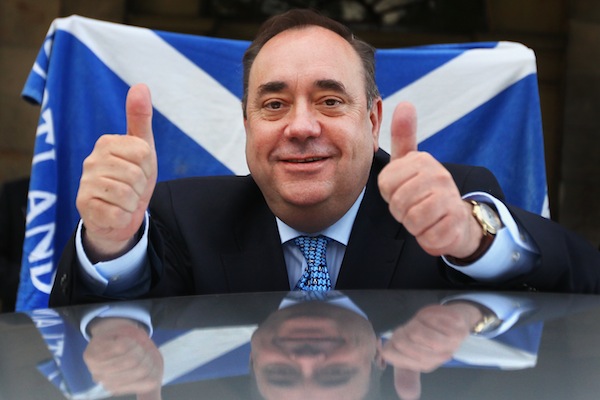With two years to go, Alex Salmond’s campaign for a ‘Yes’ vote in the Scottish independence referendum is facing a big challenge to turn around public opinion. Ipsos MORI have a new poll out today, showing almost two-to-one opposition to independence, and support for Salmond’s cause has been declining all year.
This matches the findings of two other pollsters. YouGov found the split going from 33 ‘yes’/53 ‘no’ in January to 27-60 in August. And TNS-BMRB have it going from 35-44 in January to 28-53 this month.
So the SNP has its work cut out — it needs to change plenty of Scottish minds if its even going to make the 2014 vote close. They seem to be testing out messages to achieve this, having commissioned a YouGov poll last week.
The first message is that, as Nicola Sturgeon put it at the SNP conference in Perth today, ‘it is fundamentally better for all of us if decisions affecting Scotland are taken by the people who care most about Scotland — that is, the people of Scotland’. The poll asked:
‘In general, which government do you think is better at making decisions for Scotland?’
It found 64 per cent choosing the Scottish government against just 24 per cent for the UK government.
The second message is that independence would make Scots better off economically. As Fraser’s noted, the Scottish Social Attitudes survey has already observed the power of this argument: if it would make them £500 a year worse off, 66 per cent would reject independence; if it made them £500 a year better off, 65 per cent would support it. And the SNP’s new YouGov poll backs that up (albeit to a lesser extent). It asked:
‘If the ‘Yes’ campaign could persuade you that you and your family would be economically better off with Scottish independence, in these circumstances, how likely or unlikely would you be to vote ‘Yes’ for an independent Scotland in 2014?’
It found 45 per cent saying they’d be likely to, compared to 36 per cent unlikely.
Unfortunately for Salmond and co, that Social Attitudes survey also shows that Scots don’t think independence is in their economic interests. Just a third believe it would make them better off, while the majority say it’d either make them worse off or leave things the same.
So how do the SNP intend to convince them? The clue’s in the preamble to that YouGov question:
‘The ‘Yes’ campaign is deploying a series of arguments as part of their campaign to achieve a ‘Yes’ vote for an independent Scotland in the referendum in 2014 – for example they point to statistics showing that Scotland generates 9.6 per cent of UK taxes, but receives just 9.3 per cent of UK spending in return.’
That claim is true for Scotland in 2010-11, but only if you grant it 90.5 per cent of North Sea oil revenues. If those revenues were allocated on a per capita basis, Scotland would generate just 8.4 per cent of total UK revenues. And again, the idea that Scotland gives too much and gets too little is rejected by the majority of Scots. The Social Attitudes survey found 51 per cent saying Scotland’s share of spending is fair or more than fair, against 42 per cent who say it’s less than fair. That may be partly because, in 2010-11, spending per head in Scotland was £11,785 compared to £10,663 in England.
The third message the SNP got YouGov to test was their opposition to Trident. The poll asked:
‘Do you think that the Scottish Parliament should have more powers so that it can bring about the removal of Trident nuclear weapons from Scottish waters?’
46 per cent said yes, 35 per cent said no. But a more useful question for the SNP to ask is how important that issue is to people when considering how to vote on independence. My suspicion is: not very.






Comments